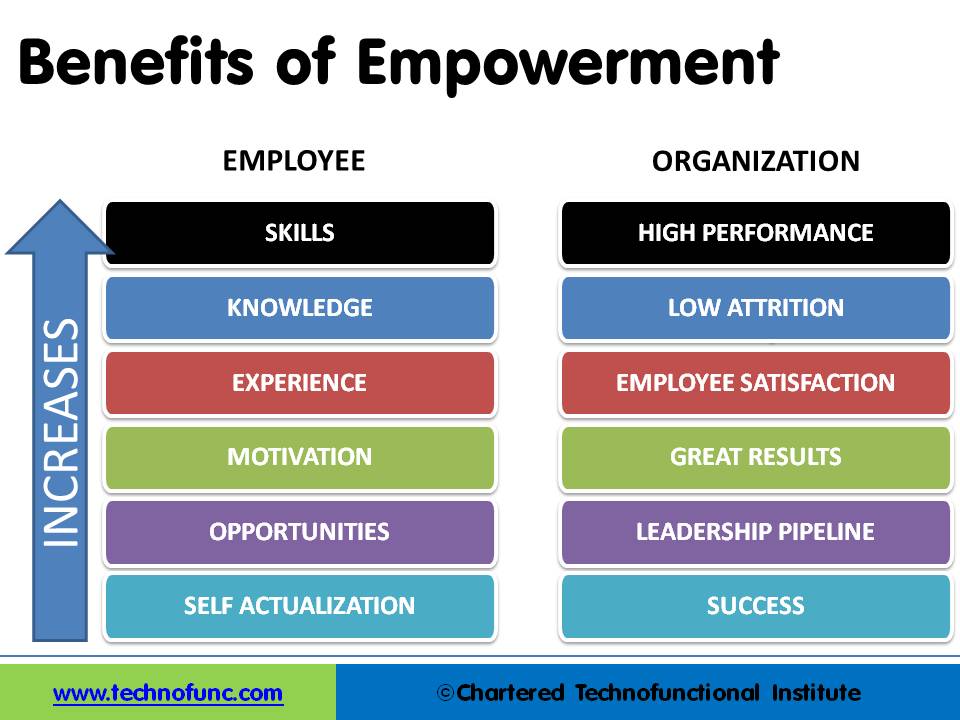- Home
- Business Processes
- Industry Knowledge
- Aerospace Industry
- Automotive Industry
- Banking Domain
- BFSI Industry
- Consumer/ FMCG Industry
- Chemicals Industry
- Engineering & Construction
- Energy Industry
- Education Domain
- Finance Domain
- Hospitality Domain
- Healthcare Industry
- Insurance Domain
- Retail Industry
- Travel and Tourism Domain
- Telecom Industry
- Leadership Skills
- eLearning
- Home
- Leadership
- Time Management
- Benefits of Empowerment
Benefits of Empowerment
Teams are certainly very relevant and important elements in today’s high-performance organization but the important thing to remember as a leader is that we can’t simply rely on putting highly effective individuals together to make a highly effective team. Empowerment increases the effectiveness of the team and drives many intangible benefits both for the organization and the employees.
Effective teams often require the right mix of people, skills, resources, and a focus on building good working relationships. Empowering your team members allows leaders to utilize the skills, knowledge, experience and motivation of their entire talent base. Let’s understand how to empower your team members to achieve great wins!
What is Empowerment?
Empowerment is the authority or power given to someone to do something. Empowerment refers to the delegation of some authority and responsibility to employees and involving them in the decision-making process, not in mere job activities, but rather at all the levels of management. Empowered employees develop loyalty and trust and they are proud to be working for the company and are eager to contribute to company success. People can be “empowered” to make decisions at work. They can be “empowered” to speak up with new ideas. Employees can also be “empowered” to act when the integrity of the organization is at stake.
Benefits to the Employee
Empowerment provides new opportunities to your team members to develop and stretch beyond their current capabilities and acquire new skills. It helps in increasing their motivation level, creates new opportunities to develop their leadership skills and satisfy their self-actualization needs. Empowered employees have increased self-confidence, are keen to develop their own skills, and also to find ways to make use of those skills to the company's benefit.
It brings a sense of ownership to the employee due to which he personalizes the goals and objectives of the organization and associates his success with his own abilities. Also, the performance of the employee improves as he attaches self-induced rewards with his performance by making decisions pertaining to the problem and sees the results (success) that follow.

Benefits to the Organization
On the other hand, it brings immense benefits to the organization and to the project or the program. Performance increases, people feel more satisfied and there is low attrition. You can achieve great results and exposure builds the leadership pipeline for your organization. Empowerment is all about mutual success where everyone wins.
Empowerment increases the organization’s responsiveness towards the problems or issues. Also, there is an increase in the productivity of an employee as he is completely engaged with the firm and takes decisions for the betterment of the organization as a whole. The benefits are numerous and well-documented — happier, more productive employees, a higher level of engagement, enhanced customer service, reduced stress, increased innovation, more pride and loyalty, less stagnancy, and an organization that is more adaptable to change. Plus, it just makes the workplace more pleasant for everyone.
Empowering your team is not difficult, but it does require a conscious effort. A tremendous shift in thinking is required by both leaders and professionals to make empowerment work.
Related Links
You May Also Like
-
Concept & Definition of Stress
Stress is a popular expression used by people in day to day life. Pressures of day to day living sometimes necessitate coping or dealing with them and stretch the body beyond its natural capacity. They are called stressors. Stress is a natural, ongoing dynamic, and interactive process that takes place as people adjust to their environment.
-
Evidence of the medically damaging symptoms of work stress necessitates applying the treatment of stress management. Stress management is increasingly drawing the attention to the management experts not only as a remedial measure but also as a way to resource management. If the workplace can be made a little more lovable the increase in the achievement of the organization may be much time more. If group stress can be removed by introducing group discussions and recreational facilities a long-lasting team spirit may get developed.
-
Teams are certainly very relevant and important elements in today’s high-performance organization but the important thing to remember as a leader is that we can’t simply rely on putting highly effective individuals together to make a highly effective team. Empowerment increases the effectiveness of the team and drives many intangible benefits both for the organization and the employees.
-
Storming Stage of Team Development
Storming is the second stage of team development and this stage is characterized by a bid for power and inter-personal conflicts. Learn the key factors that occur in the storming stage and the strategies that a team leader can adopt to pass this stage of high winds
-
Participative leadership is one of the most effective styles and creates higher productivity, better contributions from group members, and increased group morale. The democratic leadership style consists of the leader sharing the decision-making abilities with group members by promoting the interests of the group members. Learn more about this leadership style and situations when it is effective.
-
Teams are part of the modern organizational culture. Whether you are a team leader or a team member, having a better understanding of how teams work, and being able to identify where the team is in the process, is a critical part of ensuring the team is ultimately successful. Start with the basics and understand what a team is and what role they play in an organization.
-
In this study of power, Raven identified five bases of power as coercive, reward, legitimate, referent, and expert. The 5 Types of Power can help you decide when it is appropriate to use a particular type of power in important situations. Leadership involves authority and it is very important for leaders to understand what type of power they're using.
-
Narrative leadership is interpreted as the leader who aspires to construct leadership by telling stories. Leadership is a task of persuasion, of winning people’s minds and hearts. Storytelling is thus inherently suited for the task of leadership. Learn about the narrative leadership style and how to use this style to inspire and motivate followers or to manage change.
-
Laissez-faire is a style of leadership that affords the group members a great deal of independence. Tasks are delegated to the group members and they are responsible to see the project through to fruition. Research has shown that this style of leadership leads to the lowest levels of productivity. This article explains this style and covers the implications of having a hands-off approach and the situations where this style could be effective.
-
Stress is an essential part of our life. No one can live without stress. Stress can be beneficial as well as harmful. Stress as a positive influence adds excitement and hope while as a negative influence it can result in destructive feelings, anger, and depression. Although the general orientation to stress is to consider unfavorable outcomes, yet one must have observed that stress experiences may also facilitate the development of effective and varied coping behavior, increased personal resources, and lead to a sense of competence in development. Stress at a moderate level is not only inevitable but may be useful for physical and mental well-being.
Explore Our Free Training Articles or
Sign Up to Start With Our eLearning Courses

About Us
Learning
© 2023 TechnoFunc, All Rights Reserved










